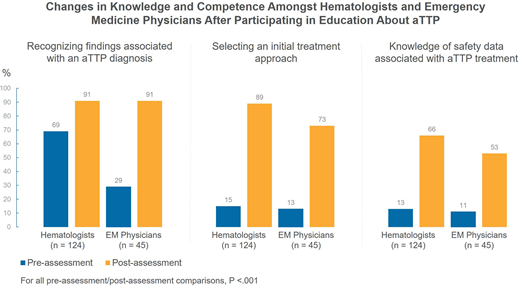INTRODUCTION
The prompt recognition and treatment of acquired thrombotic thrombocytopenic purpura (aTTP) is critical to prevent life-threatening consequences; however, this condition continues to be under-diagnosed and associated with significant mortality. Reducing mortality rates and improving outcomes is dependent on clinician awareness of aTTP diagnostic features, and on prompt implementation of evidence-based treatment approaches.
OBJECTIVES
This study was conducted to determine whether online case-based independent medical education could improve hematologists' and emergency medicine specialists' competence in identifying key diagnostic features of aTTP and selecting an initial treatment approach; and knowledge regarding recent clinical data on aTTP treatment.
METHODS
Hematologists and emergency medicine physicians electively participated in a 15-minute, case-based interactive online independent medical education activity on aTTP (Coppo P. Fatigue, Bruises, and Thrombocytopenia: What's Your Next Step? Launched: 1/30/2020. Data as of 4/22/2020. Available at www.medscape.org/viewarticle/923316). The effects of the education on knowledge and competence were assessed using a 3-question, repeated pairs, pre-assessment/post-assessment study design. For all questions combined, the chi-square test assessed differences from pre- to post-assessment. P values <.05 are statistically significant. The activity launched on January 30, 2020 and data were collected through April 22, 2020.
RESULTS
Overall significant improvements were seen after participation for both hematologists (average correct response rate of 33% at pre-assessment vs 82% at post-assessment; P<.001, N=124), and emergency medicine physicians (average correct response rate of 18% at pre-assessment vs 73% at post-assessment; P<.001, N=45). Specifically, there were significant improvements in recognizing laboratory findings indicative of a TTP diagnosis; selecting a triplet regimen as initial therapy for aTTP, based on current data; and understanding possible treatment-related adverse event expectations (Figure).
After participating in the activity, 44% of hematologists and 84% of emergency medicine physicians had measurable improved confidence related to their ability to manage patients presenting with signs and symptoms of aTTP.
Despite the increases in knowledge and confidence observed, the baseline rates of correct responses were low; therefore, ongoing education will be needed to reinforce knowledge and competence. Reinforcement is an important outcome from education that keeps clinicians' practices up-to-date (Lucero KS, Dunn S. Available at: http://almanac.acehp.org/p/bl/et/blogid=2&blogaid=599. Accessed June 11, 2020).
CONCLUSIONS
This study demonstrates the success of online, interactive case-based education in improving hematologists' and emergency medicine specialists' knowledge and competence in diagnosing and managing aTTP. This could lead to earlier diagnosis and a more widespread adoption of a new standard of aTTP treatment to improve overall outcomes for these patients.
Coppo:Octapharma: Consultancy; Roche: Consultancy, Research Funding, Speakers Bureau; Sanofi: Consultancy, Speakers Bureau; Takeda: Consultancy, Speakers Bureau; Alexion Pharmaceuticals, Inc.: Consultancy, Research Funding, Speakers Bureau.
Author notes
Asterisk with author names denotes non-ASH members.


This feature is available to Subscribers Only
Sign In or Create an Account Close Modal